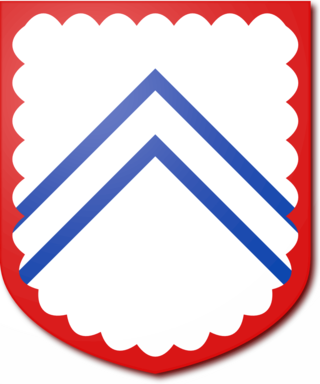Sir John Cavendish was an English judge and politician from Cavendish, Suffolk, England. He and the village gave the name Cavendish to the aristocratic families of the Dukedoms of Devonshire, Newcastle and Portland.

Sir William Brandon of Soham, Cambridgeshire was Henry Tudor's standard-bearer at the Battle of Bosworth, where he was killed by King Richard III. He was the father of Charles Brandon, 1st Duke of Suffolk.

Henry Marney, 1st Baron MarneyKG of Layer Marney, Essex was a politician of the Tudor period in England. He was a favourite of Henry VIII and captain of his guard.

Sir John Tyrrell, of Heron in the Essex parish of East Horndon, was an English landowner, lawyer, administrator, and politician who was chosen three times as Speaker of the House of Commons.

Barsham is a village and civil parish in the East Suffolk district of the English county of Suffolk. It is about 2 miles (3.2 km) west of Beccles, south of the River Waveney on the edge of The Broads National Park. It is spread either side of the B1062 Beccles to Bungay road.

Sisland is a very small village, manor and parish in the county of Norfolk, England, about a mile west of Loddon. The Parish covers an area of 1.90 km2 (0.73 sq mi) and had a population of 44 in 16 households at the 2001 census. Its church is dedicated to St Mary.
Thomas Greene of Bobbing, Kent, 2nd Proprietary Governor of Maryland was an early settler of the Maryland colony and second Provincial Governor of the colony from 1647 to 1648.

Gerard II de Lisle, 1st Baron Lisle of Kingston Lisle, was an English nobleman and soldier during King Edward III's campaigns in Scotland and France.
Sir Robert Belknap was a senior English judge.
Alice de Toeni, Countess of Warwick was a wealthy English heiress and the second wife of Guy de Beauchamp, 10th Earl of Warwick, an English nobleman in the reign of kings Edward I and Edward II. He was one of the principal opponents of Piers Gaveston, a favourite of Edward II. Alice married three times; Guy was her second husband.
Sir Thomas Canville, also written de Camville, was an Anglo-Norman landowner and judge in medieval England.
Sir Maurice Bruyn of South Ockendon, Essex was an English knight.
Maurice le Brun, 1st Baron Brun was an English peer, born in Essex.
Richard le Lacer of Bromley, Kent, was an English mercer and Mayor of London.

Guy de Bryan, 1st Baron Bryan, KG was an English military commander and Admiral.
Sir Robert Marney, of Layer Marney, Essex, and Kingsey, Buckinghamshire, was a 14th-century English politician. He was the son of Sir William Marney and his wife Katherine Venables. He has been described as "disreputable local gentry" by one 21st-century historian and was accompanied John Fitzwalter, 2nd Baron FitzWalter on various violent and criminal acts in the Colchester area.
William de Skipwith was a fourteenth-century English judge, who also served as a judge in Ireland. He held the office of Chief Baron of the Exchequer 1362-5. He suffered temporary disgrace when he was removed from office for corruption, but he was restored to favour, became Lord Chief Justice of Ireland 1370-2, and later returned to the English bench. He appears to have been the only High Court judge to have escaped impeachment by the English Parliament of 1388.
The historic manor of Iron Acton was a manor centred on the village of Iron Acton in Gloucestershire, England, situated about 9 miles (14 km) north-east of the centre of the City of Bristol. The manor house, known as Acton Court is a Tudor building which survives today, situated at some distance from the village and parish church of St Michael. It was long the principal seat of the prominent Poyntz family, lords of the manor, whose manorial chapel is contained within the parish church.

The Manor of Groves Hotel in High Wych, near Sawbridgeworth in Hertfordshire is a building of historical significance and is listed as Grade II on the English Heritage Register. It was remodelled over an existing older building in 1823 by a prominent London lawyer. The house was a private residence for many distinguished people over the next 150 years and in 1988 was converted to a hotel. It still serves this function and provides accommodation, dining facilities and caters for events such as conferences and weddings. There is also a golf course.

Sir Edward Echyngham, , of Barsham and Ipswich in Suffolk, was a commander on land and at sea, briefly Constable of Limerick Castle, and Collector of Customs at Ipswich. He is remembered as the author of a letter to Cardinal Wolsey describing the death of Lord Admiral Howard at Brest in 1513. From 1485 the presence of the Howard Dukes of Norfolk was felt directly along the Barsham reach of the River Waveney from their possession of Bungay Castle.







